Raising Capable Cooks: Why Kids Belong in the Kitchen
Getting kids involved in the kitchen is one of the most valuable investments parents can make in their child's development
After a long and grueling day at work, you walk through the door at home to find your child in the kitchen cooking. You’re met with the tantalizing aroma of garlic and onions being sauteed and your mouth waters as you take off your shoes. They inform you that dinner will be ready in 15 minutes and all you have to do is wash up and put on your jammies.
This story doesn’t have to be a work of fiction. By raising capable cooks we can share the burden of feeding our families, eat better and more nutritious meals, and teach our children valuable life-skills that will serve them well in their adult life.
This is the third and final part of my series on gender roles and household work.
Read part 1 here and part 2 here.
View my About Page to find out who I am and why I am doing this. Or—just dive right in!
At “Runamuk Acres” you’ll find the recantings of one lady-farmer and tree-hugging activist from the western mountains of Maine.
In This Post:
Why Kids Belong in the Kitchen
Kitchen Tasks by Age
Make It a Family Habit
5 Tips for Success
Ready to Get Started?
The Bottom Line
I’ve always been fairly adamant that my 2 sons would learn to cook and clean…
If you’ve been following my work, you’ll know that I strongly oppose the notion of “men’s work” or “women’s work”:
“It’s high time we embrace diversity in work and chores as the basic “life-skills” necessary for our very existence. Whether you have a homestead or just an ordinary household in an apartment in the city, boys should learn how to cook and clean, and girls should learn how to fix the plumbing and mow the lawn. Chores should be a natural part of life for every member of the family, regardless of gender or age.”
Since we eat 3 times a day—every day of our lives—no where is this more true than when it comes to cooking.
Why Kids Belong in the Kitchen
Getting kids involved in the kitchen is one of the most valuable investments parents can make in their child's development.
Far from being just a place for adults to prepare meals, the kitchen serves as a dynamic learning environment where children can develop essential life skills, build character, and strengthen family bonds. When we welcome children into this space, we're not just teaching them to cook—we're nurturing their growth into confident, capable, and well-rounded individuals.
BUILDING CONFIDENCE AND INDEPENDENCE
There's something magical about watching a child's face light up when they successfully flip their first pancake or knead their own bread dough. These small victories in the kitchen build real confidence as kids realize they can create something delicious with their own two hands.
FOSTERING TEAMWORK AND RESPONSIBILITY
Cooking naturally teaches kids that everyone has a role to play, whether it's setting the timer or helping measure ingredients. They quickly learn that their contribution matters and that the family meal depends on everyone doing their part.
ENCOURAGING HEALTHIER FOOD CHOICES AND HABITS
Kids are naturally curious about food when they're involved in making it, and they're much more likely to try that new vegetable when they helped wash and chop it themselves. This hands-on approach helps them understand where their food comes from and makes healthy eating feel like an adventure rather than a chore.
CULTURAL AND FAMILY BONDING THROUGH FOOD AND RECIPES
Some of the best family stories get shared over a mixing bowl, and there's something special about passing down Grandma's secret cookie recipe or teaching kids how to make their cultural heritage come alive through food. These moments in the kitchen create lasting memories and help children feel connected to their family's history and traditions.
BEYOND COOKING
In the kitchen, kids naturally absorb academic concepts without even realizing they're learning. From measuring ingredients to reading recipes, cooking seamlessly integrates essential educational skills into fun, hands-on activities that make abstract concepts tangible and memorable.
Kitchen Tasks by Age
Getting kids started in the kitchen doesn't have to be overwhelming—it's all about matching tasks to their developmental abilities and interests.
By gradually introducing age-appropriate activities, children can safely build their skills while having fun and contributing to family meals from a very young age.
Toddlers (Ages 2-4)
Washing fruits and vegetables in a colander
Tearing lettuce leaves for salad
Stirring ingredients in large bowls
Sprinkling cheese or seasonings on dishes
Mashing bananas or avocados with a fork
Early Elementary (Ages 5-8)
Measuring dry ingredients like flour and sugar
Cracking eggs into bowls
Mixing batters and doughs
Spreading butter or jam on bread
Using child-safe knives to cut soft items like bananas
Middle Grades (Ages 9-12)
Following simple recipes independently
Using basic kitchen tools like can openers and vegetable peelers
Chopping vegetables with proper knife safety
Operating small appliances like blenders and mixers
Preparing simple meals like scrambled eggs or pasta
Teens (Ages 13+)
Cooking complete meals from start to finish
Using all kitchen appliances safely, including stovetop and oven
Understanding food safety and proper storage
Adapting recipes and experimenting with flavors
Managing multiple cooking tasks simultaneously
Make It a Family Habit
The key to successfully involving kids in the kitchen isn't about creating perfect little chefs overnight—it's about building sustainable routines that work for your family's lifestyle. When cooking becomes a regular part of your family rhythm rather than a special occasion, children naturally develop confidence and skills while everyone enjoys the process together.
Create a Weekly Meal Schedule Together
Sit down as a family each week and plan your meals together, letting everyone contribute ideas and vote on favorites. This collaborative approach gets kids excited about upcoming meals and helps them understand the planning that goes into feeding a family.
Assign Rotating Responsibilities
Give each family member specific roles that rotate weekly, such as "salad maker," "table setter," or "dessert coordinator." This system ensures everyone stays engaged while preventing any one person from getting stuck with the same task every time.
Start with One Meal a Week That's "Kid-Led"
Choose one meal each week where a child takes the lead in planning and preparing the dish, with adults serving as helpful assistants. This gives kids ownership and pride in their contribution while building their confidence in a low-pressure environment.
Keep It Light and Fun
Remember that the goal is connection and learning, not perfection—embrace the mess, celebrate the mistakes, and focus on the joy of creating something together. Turn on music, tell stories, and don't worry if things take longer or look different than when you cook alone.
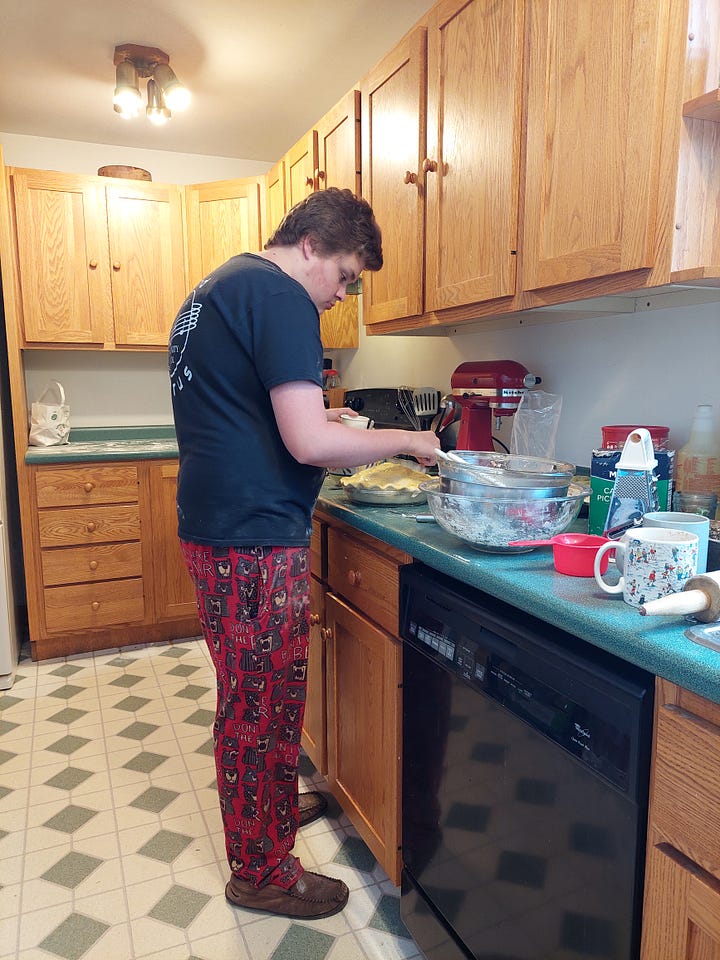
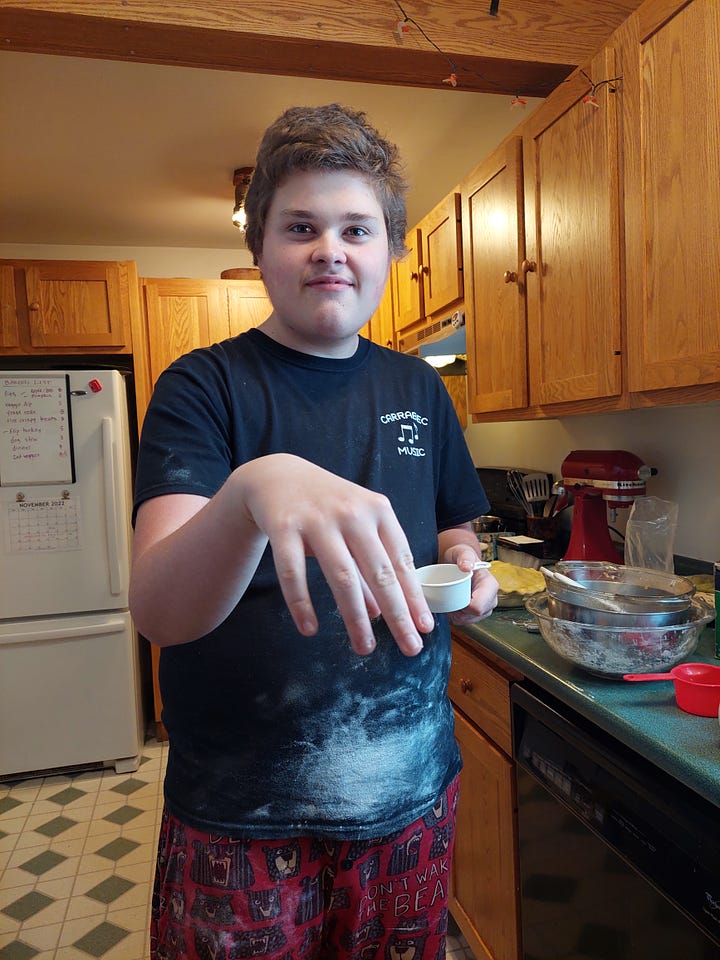
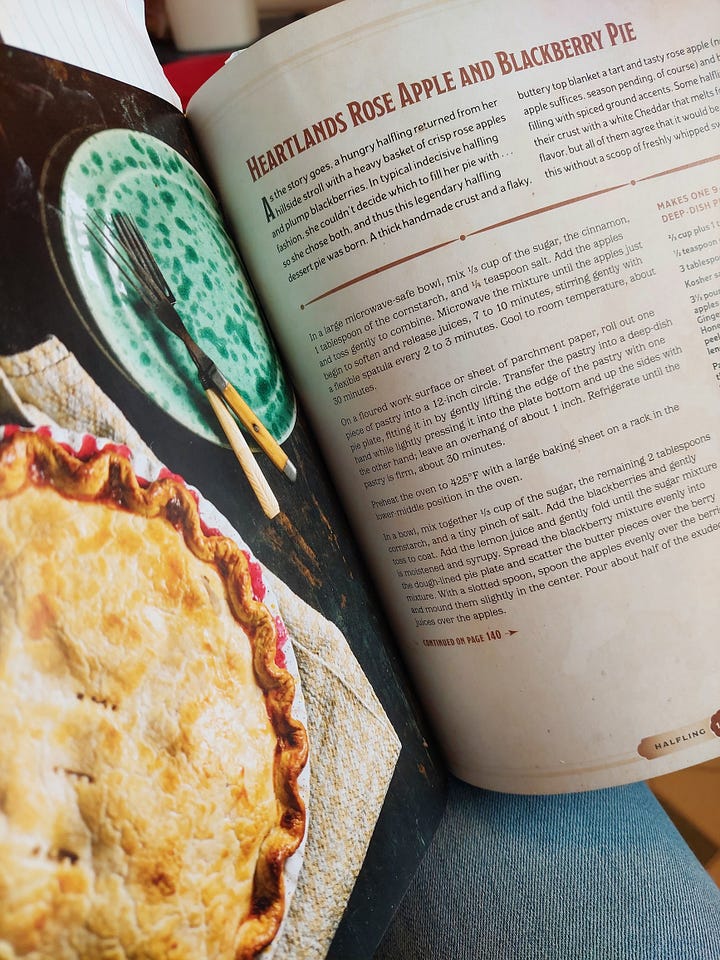

5 Tips for Success
BE PATIENT AND FLEXIBLE
Children work at their own pace and in their own way, so what might take you five minutes could easily take them twenty—and that's perfectly okay. Stay flexible with your expectations and timeline, remembering that the spilled flour and extra cleanup are all part of the learning process.
PRAISE EFFORT, NOT JUST RESULTS
Focus on celebrating the hard work and focus your child put into the task rather than just the final product. This builds resilience and keeps kids motivated to keep trying, even when their cookies turn out a little lopsided or their scrambled eggs aren't quite perfect.
KEEP KID-FRIENDLY TOOLS AND A SAFE SET-UP
Invest in child-sized utensils, sturdy step stools, and tools designed for little hands to help kids feel confident and capable. Create a safe workspace by keeping sharp knives out of reach, using non-slip mats, and ensuring pot handles are turned inward on the stove.
MAKE CLEAN-UP PART OF THE ROUTINE
Teach kids that cooking includes cleaning by making it a natural part of the process rather than something that happens after the fun is over. Turn cleanup into a game or challenge, and always have kids help with washing dishes, wiping counters, and putting ingredients away.
EAT THE FOOD YOUR KIDS MAKE
Unless it's truly inedible, eating whatever your child makes shows them that cooking doesn't have to have a perfect outcome to feed their family. This also boosts confidence and reassures your child that you love and accept them, turning even the most lopsided pancake into a symbol of their contribution to the family.
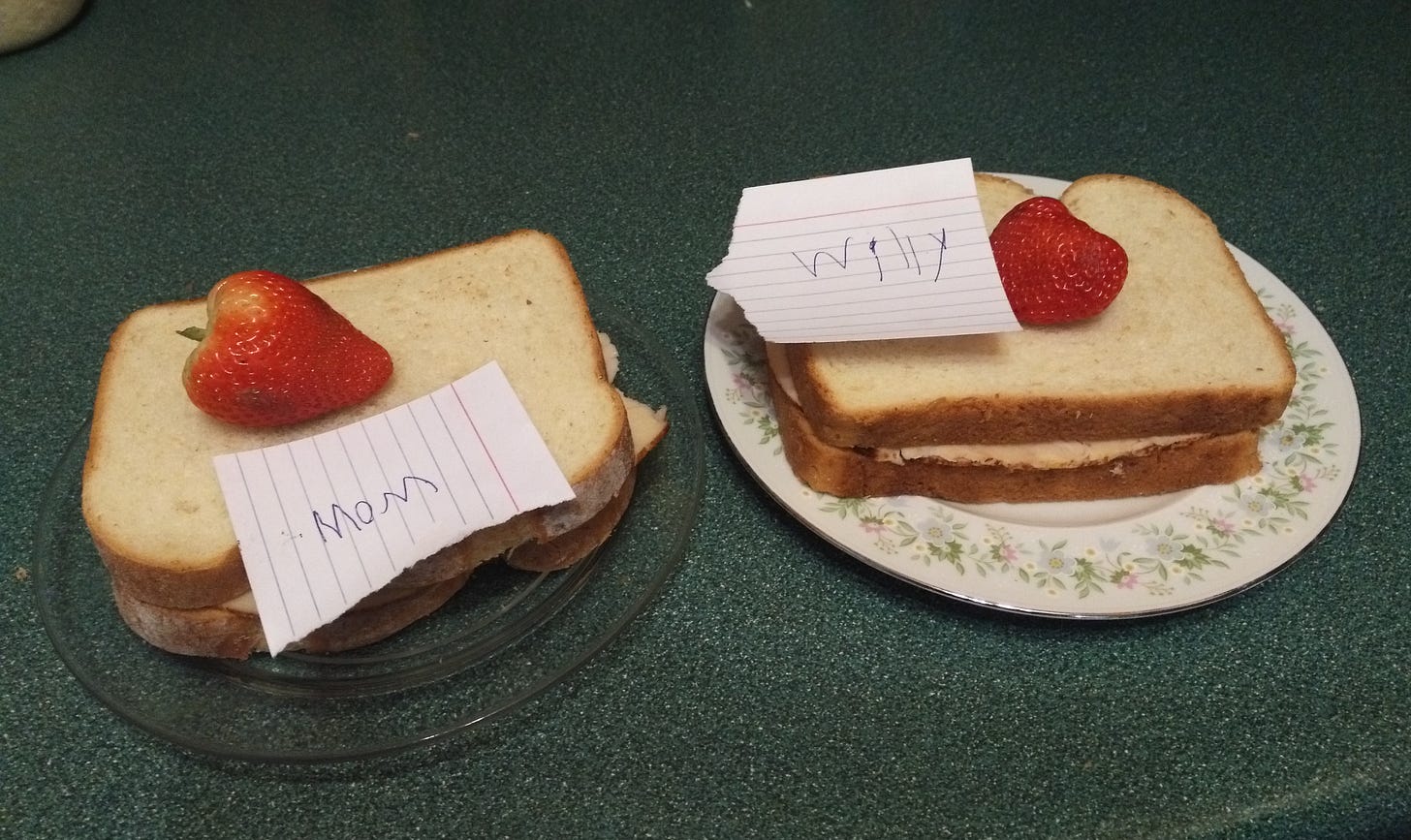
Ready to get started?
The kitchen is so much more than a place to prepare meals—it's a classroom where children learn essential life skills, a laboratory where they discover how the world works, and a gathering place where families create lasting memories together.
Every spilled ingredient, every imperfect pancake, and every proud smile over a successfully completed dish is building something far more valuable than just cooking skills. Yes—there will be messes to clean up, extra time needed for simple tasks, and moments when you wonder if it would be easier to just do it yourself. But, the long-term rewards of raising confident, capable, and connected children are immeasurable.
So why not start tonight? I urge you to plan a family cooking night this week and let your kids take the lead in choosing and preparing a meal together. You might be surprised by what they're capable of—and what you'll learn about each other in the process.
The Bottom-Line
The kitchen is a powerful developmental space where children don't just learn to cook—they build essential life skills, confidence, and family connections that will serve them throughout their lives.
Actionable Tip:
Start with "Sunday Prep Together" - pick one simple task like washing vegetables, making sandwiches for the week, or mixing pancake batter that you can do together every Sunday.…



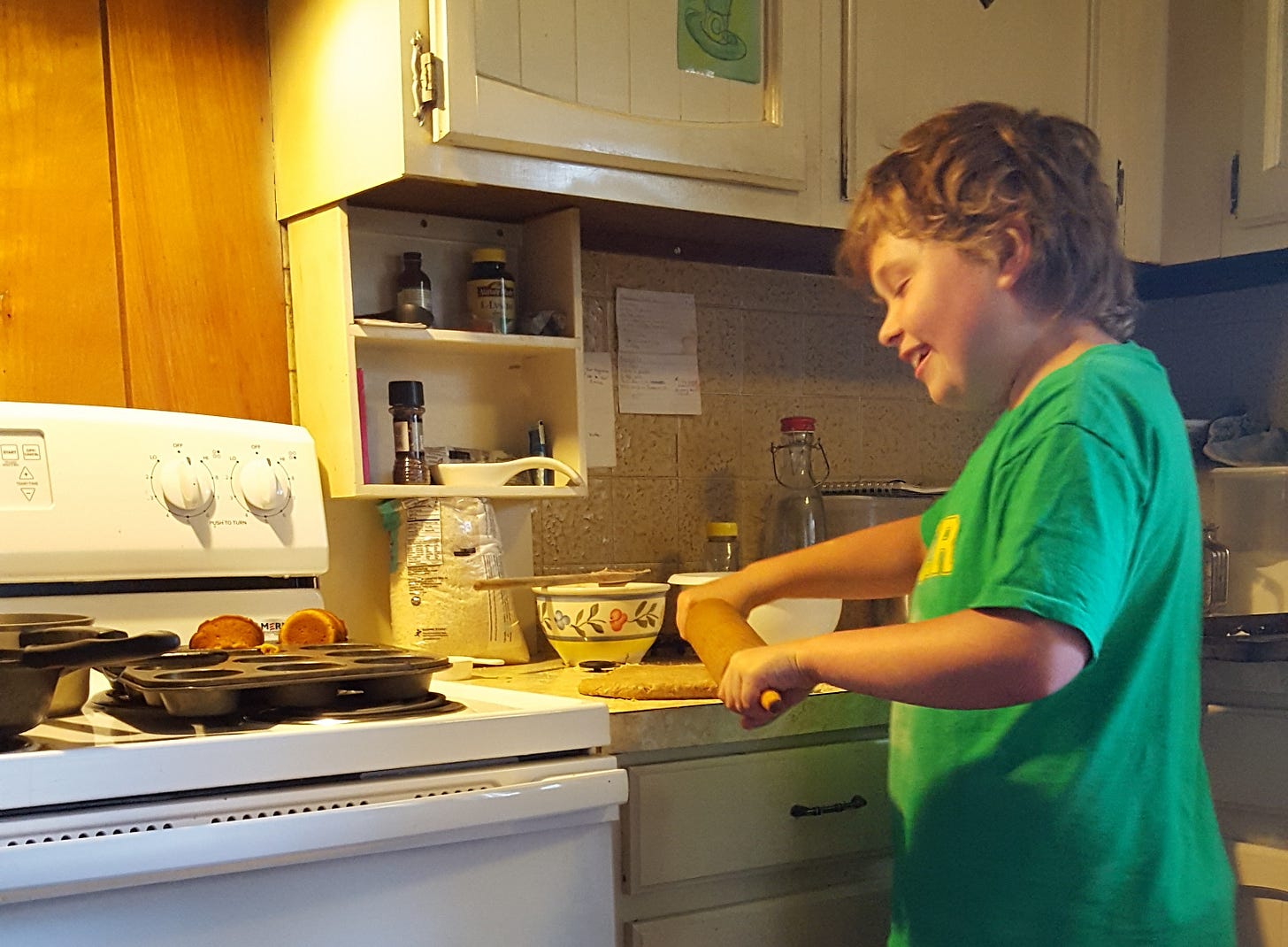

Food is something we have to deal with 20+ times a week and I’m amazed at how many people, even into their later years who have no idea how to cook routinely. Teach them young! I love it.
This is incredible! My two are familiar around the kitchen, but I was never that diligent in teaching them. They are in their upper teens now. Never too late to start, right?!
And cast iron pan for the win!!!